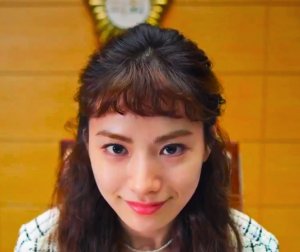This review may contain spoilers
fun drama, not worth the fuss or the flak; basic comprehension skills required
Despite the premise, what this drama actually was is a modern take on the Cyrano story with a kdrama twist. The perfect role for a second lead went to, well, a second lead, and some people were Big Mad about it, to the point they envisioned a whole different drama in their heads, then were Big Mad again when it didn't become true, and chalked it all up to bad writing. It wasn't.
Not that this drama didn't have issues, mainly the pacing and muddled middle, but that seems to be a netflix-wide problem with their kdramas. I would've wanted more focus on the sister's relationship throughout the drama, as well as other side characters, but the overstretched love triangle, while annoying at times, wasn't in vain and fell in line with the themes the drama dealt with, about taking risks and getting used to failure.
I say this because, despite the absurd discourse that ensued, within the narrative it was always made perfectly clear why ultimately Dosan would get the girl (Dalmi), and why Jipyeong wouldn't. Jipyeong was always sure of his opinions and was extremely risk-averse, which in turn meant that despite numerous chances to get closer to Dalmi, he chose the safety of distance; Dosan saw those same chances and, despite his lack of confidence, seized them, taking the risks Jipyeong wouldn't. It follows, then, that Jipyeon's journey would be about taking the risk at last (too late) and accepting failure as part of the learning process, something that as late as episode 16 he couldn't accept. And that's what the story did, it lead him to accept his flaws and come to accept that he still has a lot to learn and that mistakes and falls will happen - such as the girl you love not loving you back.
If that's why Jipyeong would lose the girl, then Dosan would "get" her because his own journey was about finding his self esteem and learning where his ambitions were and how those two things came together. Dosan's ambitions at first were directed at other people - he chose to meet Dalmi to help her, he developed Noongi to help her grandma, he opened Sansam Tech to help out his friends. His ambitions weren't about what he wanted, but they were tied to how they made him feel. It took meeting Dalmi for him to realize that he was allowed to want things for himself and not for others, things that made him feel good and confident in himself. It turns out that his ambitions weren't outward but inward - he wanted to BE wanted, for who he was and what he offered, nothing else, to know that who he is was enough. Not fancy jobs or titles, and that never changed about him. That's why Dalmi was his dream, because in his case, wanting her meant choosing his own wants before others.
But what about Dalmi? What irks me about this whole discussion is how little people seem to care about what she wants. She's the center of the plot, the reason all those pieces are set in motion, and is kept blind for half the drama about it. And that's because, while Dalmi became Dosan's dream, so to speak, her journey was about giving him up as hers. The Dosan of her letters wasn't Dosan, and it wasn't Jipyeong either - it was a fiction she held onto for much longer than was healthy, a lifeline when she lost her father that became an anchor dragging her down as an adult. For all that she wanted to follow in her father's footstep, she was trapped in her comfort zone. It took meeting Dosan, the real Dosan, to turn her fantasy dreams into real, actionable dreams, because he stopped being someone who existed in her mind, to someone who was real and offered her the tools to achieve all that her father had wanted. It's not for nothing that his hands were a big motif in their relationship - hands do things, they're about action, and that's what Dosan offers Dalmi, the chance to try things and take risks, and they also catch you if you fall, and pull you back up.
I'm genuinely sorry for the people who suffered SLS, but for those convinced the story went downhill and nothing made sense anymore, maybe take a long hard look at your own interpretation of the story and how far it deviated from the real thing. A lot of us watching from the sidelines were horrified by the extent to which a subset of fans twisted the story to fit their vision, all the while knowing it would come crashing down on them. And it did.
Not that this drama didn't have issues, mainly the pacing and muddled middle, but that seems to be a netflix-wide problem with their kdramas. I would've wanted more focus on the sister's relationship throughout the drama, as well as other side characters, but the overstretched love triangle, while annoying at times, wasn't in vain and fell in line with the themes the drama dealt with, about taking risks and getting used to failure.
I say this because, despite the absurd discourse that ensued, within the narrative it was always made perfectly clear why ultimately Dosan would get the girl (Dalmi), and why Jipyeong wouldn't. Jipyeong was always sure of his opinions and was extremely risk-averse, which in turn meant that despite numerous chances to get closer to Dalmi, he chose the safety of distance; Dosan saw those same chances and, despite his lack of confidence, seized them, taking the risks Jipyeong wouldn't. It follows, then, that Jipyeon's journey would be about taking the risk at last (too late) and accepting failure as part of the learning process, something that as late as episode 16 he couldn't accept. And that's what the story did, it lead him to accept his flaws and come to accept that he still has a lot to learn and that mistakes and falls will happen - such as the girl you love not loving you back.
If that's why Jipyeong would lose the girl, then Dosan would "get" her because his own journey was about finding his self esteem and learning where his ambitions were and how those two things came together. Dosan's ambitions at first were directed at other people - he chose to meet Dalmi to help her, he developed Noongi to help her grandma, he opened Sansam Tech to help out his friends. His ambitions weren't about what he wanted, but they were tied to how they made him feel. It took meeting Dalmi for him to realize that he was allowed to want things for himself and not for others, things that made him feel good and confident in himself. It turns out that his ambitions weren't outward but inward - he wanted to BE wanted, for who he was and what he offered, nothing else, to know that who he is was enough. Not fancy jobs or titles, and that never changed about him. That's why Dalmi was his dream, because in his case, wanting her meant choosing his own wants before others.
But what about Dalmi? What irks me about this whole discussion is how little people seem to care about what she wants. She's the center of the plot, the reason all those pieces are set in motion, and is kept blind for half the drama about it. And that's because, while Dalmi became Dosan's dream, so to speak, her journey was about giving him up as hers. The Dosan of her letters wasn't Dosan, and it wasn't Jipyeong either - it was a fiction she held onto for much longer than was healthy, a lifeline when she lost her father that became an anchor dragging her down as an adult. For all that she wanted to follow in her father's footstep, she was trapped in her comfort zone. It took meeting Dosan, the real Dosan, to turn her fantasy dreams into real, actionable dreams, because he stopped being someone who existed in her mind, to someone who was real and offered her the tools to achieve all that her father had wanted. It's not for nothing that his hands were a big motif in their relationship - hands do things, they're about action, and that's what Dosan offers Dalmi, the chance to try things and take risks, and they also catch you if you fall, and pull you back up.
I'm genuinely sorry for the people who suffered SLS, but for those convinced the story went downhill and nothing made sense anymore, maybe take a long hard look at your own interpretation of the story and how far it deviated from the real thing. A lot of us watching from the sidelines were horrified by the extent to which a subset of fans twisted the story to fit their vision, all the while knowing it would come crashing down on them. And it did.
Was this review helpful to you?





